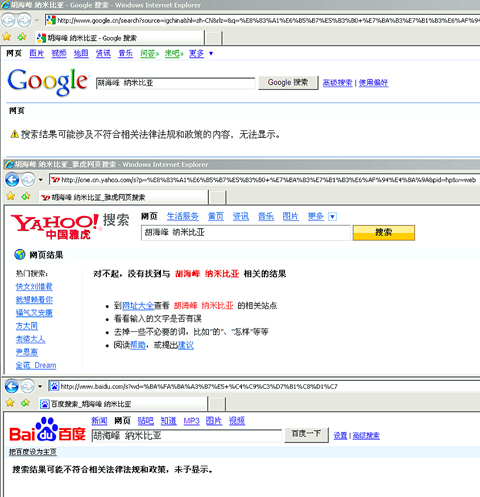China’s Internet censors blocked news yesterday about a graft probe in Namibia involving a firm linked to the son of Chinese President Hu Jintao (胡錦濤) as the state-run media ignored the sensitive issue.
Two Namibians and a Chinese national were arrested last week in Namibia as part of a probe into bribery allegations involving Nuctech, a company headed until last year by Hu’s 38-year-old son, Hu Haifeng (胡海峰).
Searches for information on the case and Hu Haifeng’s connection to it on Chinese Web portals turned up error messages such as: “The search results may contain content not in line with relevant laws, regulations and policies.”

PHOTO: BLOOMBERG
Such results on China’s heavily censored Internet are typically returned when a Web user seeks banned information.
China has a history of blocking access to sensitive data on the Internet, especially concerning politics and the lives of top leaders.
Popular sites such as Facebook, YouTube and Twitter have been blocked for weeks as censors sought to limit the information flow over the deadly unrest in Xinjiang and the 20th anniversary of the Tiananmen Square crackdown.
The US-based China Digital Times, which monitors Web developments in China, said propaganda officials had issued an order banning various Internet searches related to the Nuctech case.
China Digital Times and media watchdog Reporters Without Borders said it appeared the Nuctech Internet censorship had been in place for a few days.
China’s mainstream media is tightly controlled by the government, and newspapers as well as TV news have also made no mention of the Nuctech case in recent days.
Hu Haifeng was president of Nuctech, which provides scanning technology, until last year, when he was promoted to Chinese Communist Party secretary of Tsinghua Holdings, which controls Nuctech and more than 20 other companies.
Nuctech provides security scanning equipment.
Nuctech representative Yang Fan (楊帆) and two Namibians, Teckla Lameck and Jerobeam Mokaxwa, were arrested after Namibia’s Anti-Corruption Commission (ACC) discovered that a US$12.8 million down payment on 13 scanners had been diverted to a firm called Teko Trading owned by the two Namibians.
Nuctech has a Namibian government contract to supply security scanning equipment in a US$55.3 million deal, paid for with a Chinese loan granted when the Chinese president visited the country in 2007.
Investigators say the down payment was diverted to Teko Trading between March and April.
All three of the accused later drew large sums from the Teko account, with Yang taking 16.8 million Namibian dollars (US$2.1 million), most of which he is said to have paid into an investment fund, investigators said.
China’s foreign ministry declined comment when contacted by reporters about the case on Wednesday, referring queries to Nuctech.
Staff at Nuctech’s Beijing-based headquarters, however, also declined comment.
“We never speak to the media,” a woman who answered the phone said.

SECURITY: As China is ‘reshaping’ Hong Kong’s population, Taiwan must raise the eligibility threshold for applications from Hong Kongers, Chiu Chui-cheng said When Hong Kong and Macau citizens apply for residency in Taiwan, it would be under a new category that includes a “national security observation period,” Mainland Affairs Council (MAC) Minister Chiu Chui-cheng (邱垂正) said yesterday. President William Lai (賴清德) on March 13 announced 17 strategies to counter China’s aggression toward Taiwan, including incorporating national security considerations into the review process for residency applications from Hong Kong and Macau citizens. The situation in Hong Kong is constantly changing, Chiu said to media yesterday on the sidelines of the Taipei Technology Run hosted by the Taipei Neihu Technology Park Development Association. With

CARROT AND STICK: While unrelenting in its military threats, China attracted nearly 40,000 Taiwanese to over 400 business events last year Nearly 40,000 Taiwanese last year joined industry events in China, such as conferences and trade fairs, supported by the Chinese government, a study showed yesterday, as Beijing ramps up a charm offensive toward Taipei alongside military pressure. China has long taken a carrot-and-stick approach to Taiwan, threatening it with the prospect of military action while reaching out to those it believes are amenable to Beijing’s point of view. Taiwanese security officials are wary of what they see as Beijing’s influence campaigns to sway public opinion after Taipei and Beijing gradually resumed travel links halted by the COVID-19 pandemic, but the scale of

A US Marine Corps regiment equipped with Naval Strike Missiles (NSM) is set to participate in the upcoming Balikatan 25 exercise in the Luzon Strait, marking the system’s first-ever deployment in the Philippines. US and Philippine officials have separately confirmed that the Navy Marine Expeditionary Ship Interdiction System (NMESIS) — the mobile launch platform for the Naval Strike Missile — would take part in the joint exercise. The missiles are being deployed to “a strategic first island chain chokepoint” in the waters between Taiwan proper and the Philippines, US-based Naval News reported. “The Luzon Strait and Bashi Channel represent a critical access

Pope Francis is be laid to rest on Saturday after lying in state for three days in St Peter’s Basilica, where the faithful are expected to flock to pay their respects to history’s first Latin American pontiff. The cardinals met yesterday in the Vatican’s synod hall to chart the next steps before a conclave begins to choose Francis’ successor, as condolences poured in from around the world. According to current norms, the conclave must begin between May 5 and 10. The cardinals set the funeral for Saturday at 10am in St Peter’s Square, to be celebrated by the dean of the College